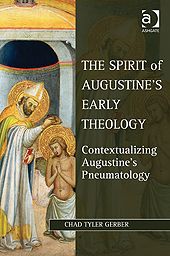The Spirit of Augustine’s Early Theology, reviewed by Tony Richie
 Chad Tyler Gerber, The Spirit of Augustine’s Early Theology: Contextualizing Augustine’s Pneumatology (Farnham, Surrey, UK: Ashgate, 2012), 221 pages, ISBN 9781409424376.
Chad Tyler Gerber, The Spirit of Augustine’s Early Theology: Contextualizing Augustine’s Pneumatology (Farnham, Surrey, UK: Ashgate, 2012), 221 pages, ISBN 9781409424376.
Chad Tyler Gerber is Assistant Professor of Theology at Walsh University, USA. This book is part of the Ashgate Studies in Philosophy and Theology in Late Antiquity. The series focuses on major theologians from the patristic period as individuals immersed in their own culture. It somewhat uniquely aims to understand the convergence or divergence of pagan and Christian thought on issues addressed by both streams. Accordingly, it hopes to ascertain the true creativity of a particular author and to assess the abiding value of his thought for modern times. This text is serious theology so lay people or even many clergy may not find it easily palatable. However, teachers and advanced students of theology will definitely find it a rewarding and worthwhile read. Augustine is indisputably one of the giants of Christian thought, and Gerber offers a fresh and vigorous look at his pneumatology. That alone is cause for acclaim. Accordingly, those interested in patristic studies in general or in Augustine in particular as well as his pneumatology will benefit from The Spirit of Augustine’s Early Theology. I suspect Pentecostal and Charismatic theologians should be especially interested in the depths of Augustine’s theology of the Holy Spirit.
Gerber explains that “Augustine’s pneumatology remains one of his most distinctive, decisive, and ultimately divisive contributions” to Christian theology. Several questions guide Gerber’s work on this text. How did Augustine’s understanding of the Spirit develop? Why does he identify the Spirit with divine love and cosmic order? What were the sources of his inspiration? Gerber focuses on the early Augustine and his first writings in order to get at the seminal roots of his more mature thought. He is particularly interested in the Platonic influence on Augustine’s pneumatology and in the possibility of his continuing commitment to the divinity of the human soul. (In a brief appendix, Gerber sums up his argument that Augustine rejected the divinity of the soul; but, he suggests Augustine appropriated certain functions of the Plotinian Soul regarding the particularity of the Holy Spirit, especially his idea of the Spirit as the “ordinator” of the world.)
Following the contours of Augustine’s early writings and the locale of their construction, Gerber presents his material in four chapters. After a brief introduction, Chapter One on “Nicea and Neoplatonism” (386-87 AD) examines the influence of Nicea and Neoplatonism on the budding theologian’s early Trinitarian theology as he writes from Milan. Gerber concludes that “at bottom” Augustine’s early Trinitarian theology was “pro-Nicene” and also made use of “Plotinian triadology”. He suggests the early Augustine still had much to learn about both Neoplatonism and pro-Nicene theology; but, he had sufficiently grasped the central tenets of both in such as way as to understand and express his theology in terms that would remain essentially the same throughout his subsequent writings.
In Chapter Two, “The Soul of Plotinus and the Spirit of Nicea,” studying the Cassiciacum Dialogues (386-87 AD), Gerber gets to a more specific pneumatology and also to the delicate relation in Augustine between Plotinus’ philosophy and Nicene theology. Gerber suggests that Augustine’s more or less random invocations on pneumatology at this point nevertheless adhere to a consistent “redemptive-historical perspective in which God the Spirit leads fallen souls to God the Son.” Augustine is apparently influenced here by the New Testament and by patristic writings. The theme of “return” is also evident, and Plotinus appears to have provided “a psychological model of ascent” in which the soul’s salvation involves a vision of “archetypal Truth and a ‘return'” to God as “the ultimate source of all things” (although Romans 11:36 is key). Gerber, however, judges the material too scarce at this point to make sweeping conclusions about specific ideas concerning pneumatology and cosmic order.
Category: In Depth


